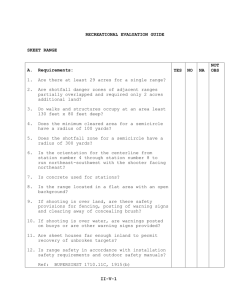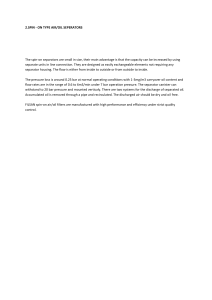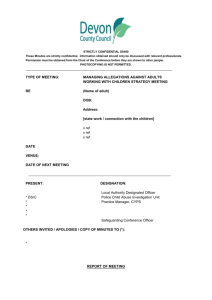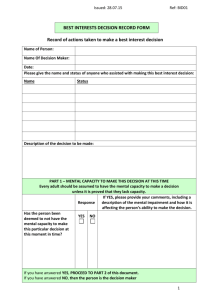Chapter 6 pages 200-213
advertisement
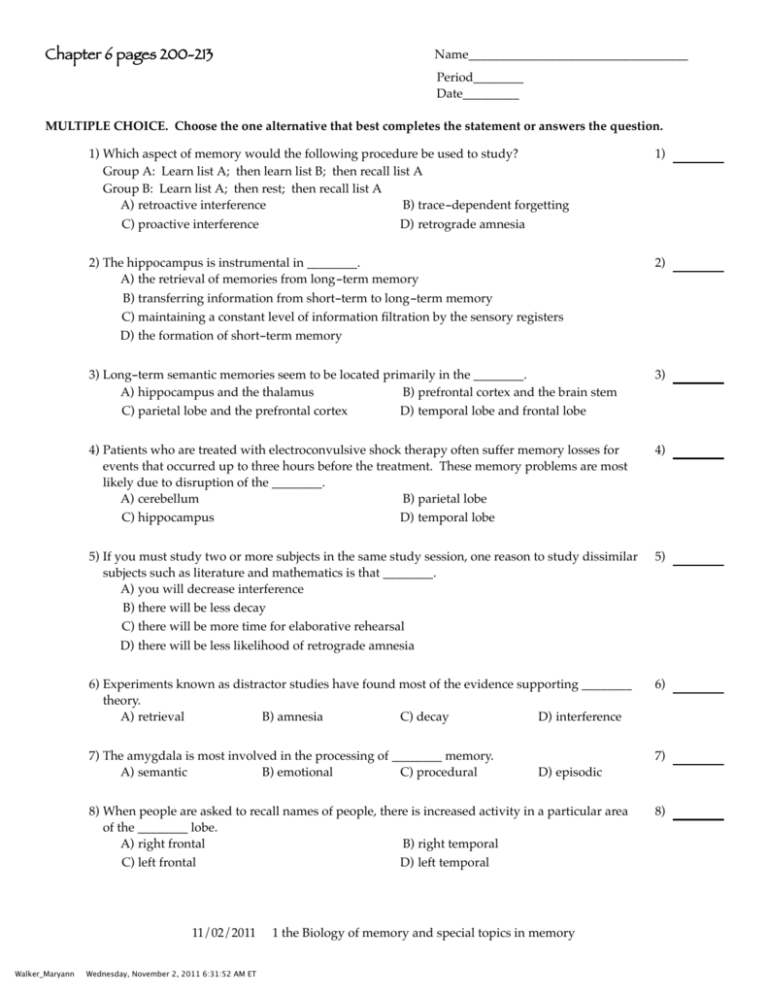
Chapter 6 pages 200-213 Name___________________________________ Period________ Date_________ MULTIPLE CHOICE. Choose the one alternative that best completes the statement or answers the question. 1) Which aspect of memory would the following procedure be used to study? Group A: Learn list A; then learn list B; then recall list A Group B: Learn list A; then rest; then recall list A A) retroactive interference B) trace-dependent forgetting C) proactive interference D) retrograde amnesia 1) 2) The hippocampus is instrumental in ________. A) the retrieval of memories from long-term memory B) transferring information from short-term to long-term memory C) maintaining a constant level of information filtration by the sensory registers D) the formation of short-term memory 2) 3) Long-term semantic memories seem to be located primarily in the ________. A) hippocampus and the thalamus B) prefrontal cortex and the brain stem C) parietal lobe and the prefrontal cortex D) temporal lobe and frontal lobe 3) 4) Patients who are treated with electroconvulsive shock therapy often suffer memory losses for events that occurred up to three hours before the treatment. These memory problems are most likely due to disruption of the ________. A) cerebellum B) parietal lobe C) hippocampus D) temporal lobe 4) 5) If you must study two or more subjects in the same study session, one reason to study dissimilar subjects such as literature and mathematics is that ________. A) you will decrease interference B) there will be less decay C) there will be more time for elaborative rehearsal D) there will be less likelihood of retrograde amnesia 5) 6) Experiments known as distractor studies have found most of the evidence supporting ________ theory. A) retrieval B) amnesia C) decay D) interference 6) 7) The amygdala is most involved in the processing of ________ memory. A) semantic B) emotional C) procedural 7) D) episodic 8) When people are asked to recall names of people, there is increased activity in a particular area of the ________ lobe. A) right frontal B) right temporal C) left frontal D) left temporal 11/02/2011 Walker_Maryann Wednesday, November 2, 2011 6:31:52 AM ET 1 the Biology of memory and special topics in memory 8) 9) Tammy is talking to her grandfather. She loves to listen to him tell stories about when he was a child. He has vivid recollections of his youth and enjoys telling people about his fond memories. Unfortunately, grandpa has difficulty remembering what happened within the last few days or weeks. If there are no physiological problems, grandpa's memory problems are BEST explained by ________. A) retrograde amnesia B) memory diffusion C) retroactive interference D) proactive interference 10) Decay theory appears to affect forgetting in ________. A) short-term but not long-term memory B) neither short-term or long-term memory C) long-term but not short-term memory D) both short-term and long-term memory 10) 11) Head injuries, such as concussions, are a common cause of ________. A) Korsakoff's syndrome B) Milner's syndrome C) psychogenic amnesia D) retrograde amnesia 11) 12) Tim is studying for a test. After seven consecutive hours of studying, he finds he can remember what he studied five or six hours ago, but he cannot remember what he studied just ten minutes ago. Tim's memory problems are BEST explained by ________. A) retrograde amnesia B) retroactive interference C) memory diffusion D) proactive interference 12) 13) The finding that people tend to better remember information if they try to recall it while surrounded by the same physical cues (wall color, smells, sounds, desks, etc.) in which they learned it, is called ________ memory. A) state-dependent B) retroactive C) context-dependent D) cue-controlled 13) 14) The finding that people who learn material in a particular physiological condition tend to recall that material better if they return to the same condition they were in during learning is called ________ memory. A) retroactive B) cue-controlled C) context-dependent D) state-dependent 14) 15) If people learn material while under the influence of caffeine, they are more likely to ________. A) forget it the next time they are under the influence of caffeine B) forget it when the caffeine wears off C) remember it the next time they are under the influence of caffeine D) remember it when the caffeine wears off 15) 2 Walker_Maryann 9) Wednesday, November 2, 2011 6:31:52 AM ET 16) In interviewing witnesses to a bank robbery, detective Watson hears a slightly different story from each witness. Some witnesses say the robber was tall, while others maintain he was short. Some say he was wearing a black jacket, while others say it was blue. One person even said there were two robbers. The MOST likely explanation for these differences in the witnesses' recall is ________. A) reconstructive memory B) proactive interference C) retroactive interference D) eidetic imagery 16) 17) Mnemonists ________. A) work at actively developing memory techniques B) link new and existing material in short-term memory C) use rote rehearsal techniques D) are born with a special gift for remembering things 17) 18) The term “photographic memory” refers to the phenomenon of ________. A) flashbulb memory B) mnemonics C) spatial awareness D) eidetic imagery 18) 19) People who can perform seemingly impossible feats of memory because of their highly developed memory skills are known as ________. A) mnemonists B) semanticists C) eideticists D) episodists 19) 20) The phenomenon whereby most people cannot recall events that occurred in their life before the age of two, is called ________. A) infantile autism B) psychogenic amnesia C) pretensile amnesia D) infantile amnesia 20) 21) Each of the following is a current explanation for infantile amnesia EXCEPT ________. A) infants may lack the language skills necessary to strengthen and consolidate early experiences B) infants may lack a clear sense of self, making it difficult to organize information into a clear autobiographical scheme C) it results from repression of threatening memories, thoughts, and feelings that were too emotionally charged for the infant to cope with at the time D) the child's brain is not fully developed enough to efficiently process and store information in memory 21) 22) Many middle-aged adults can vividly recall where they were and what they were doing the day that John F. Kennedy was assassinated, although they cannot remember what they were doing the day before he was assassinated. This is an example of ________. A) an eidetic image B) a flashbulb memory C) a procedural memory D) a semantic memory 22) 23) Memories concerning events that are highly significant and are vividly remembered are called ________. A) flashbulb memories B) elaborative rehearsals C) eidetic images D) eyewitness images 23) 3 Walker_Maryann Wednesday, November 2, 2011 6:31:52 AM ET 24) Flashbulb memories ________. A) usually concern events from early childhood B) are almost always highly accurate C) are not subject to periodic revision D) usually concern events that are emotionally charged 24) 25) Each of the following is true of recovered memories EXCEPT ________. A) people who have “recovered” memories of abuse have sometimes later realized that the events never occurred B) psychotherapists may shape people's recollections of early childhood memories C) overzealous therapists may unwittingly create false memories by leading patients to vividly imagine incidents that never happened D) there is no evidence that any of them are memories of actual events 25) 26) In summary, research on recovered memories ________. A) has been unable to find a reliable way, thus far, of separating real memories from false ones B) indicates they are usually detailed and highly accurate C) indicates they are usually vague and unreliable D) has found that they are usually the creations of overzealous therapists and other external sources 26) TRUE/FALSE. Write 'T' if the statement is true and 'F' if the statement is false. 27) Memories are randomly distributed throughout the brain. 27) 28) Flashbulb memories are almost always accurate. 28) 29) Eyewitness testimony is generally very accurate and reliable. 29) 30) No single part of the brain is solely responsible for memory. 30) 4 Walker_Maryann Wednesday, November 2, 2011 6:31:52 AM ET Answer Key Testname: CH 6 200-213 ONLINE QUIZ 1) A Page Ref: 205 2) B Page Ref: 202 3) D Page Ref: 201 4) C Page Ref: 202 5) A Page Ref: 205 6) C Page Ref: 204 7) B Page Ref: 202 - 203 8) D Page Ref: 201 9) D Page Ref: 205 10) A Page Ref: 204 11) D Page Ref: 204 12) D Page Ref: 205 13) C Page Ref: 206 14) D Page Ref: 206 15) C Page Ref: 206 16) A Page Ref: 206 17) A Page Ref: 210 18) D Page Ref: 209 19) A Page Ref: 210 20) D Page Ref: 209 21) C Page Ref: 209 22) B Page Ref: 210 23) A Page Ref: 210 11/02/2011 Walker_Maryann Wednesday, November 2, 2011 6:31:52 AM ET 5 the Biology of memory and special topics in memory Answer Key Testname: CH 6 200-213 ONLINE QUIZ 24) D Page Ref: 210 25) D Page Ref: 212 26) A Page Ref: 212 27) FALSE Page Ref: 201 28) FALSE Page Ref: 210 29) FALSE Page Ref: 210 - 211 30) TRUE Page Ref: 201 - 203 6 Walker_Maryann Wednesday, November 2, 2011 6:31:52 AM ET

